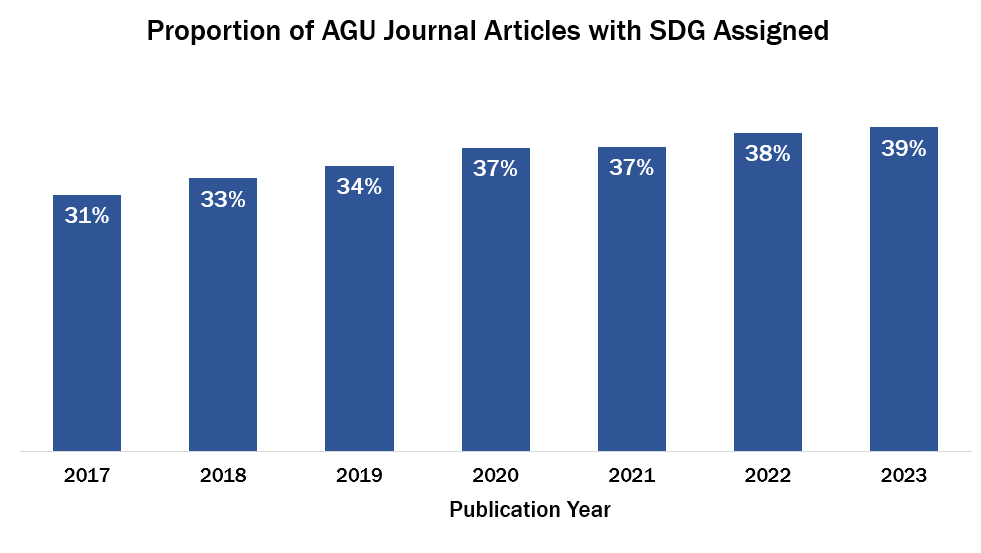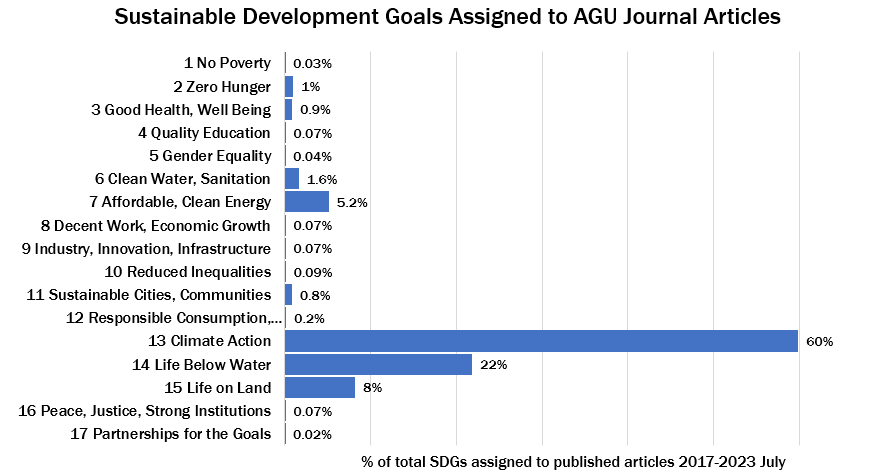Editors’ Vox is a blog from AGU’s Publications Department.
As the world’s largest scientific society for the Earth and space sciences, AGU cares about our planet, its systems, and all the living things dependent upon it. AGU’s vision includes a “thriving, sustainable and equitable future supported by scientific discovery, innovation, and action.” Our mission is to advance the potential of Earth and space sciences for the benefit of humanity and the environment. More specifically, one of the strategic goals is to “catalyze discovery and solutions to scientific and societal challenges”.
Under the umbrella of AGU, the Publications Department is committed to sustainability, sustainable development, and supporting the UN’s Sustainable Development Goals (SDGs). In recognition of Global Goals Week, an annual week of action, awareness, and accountability for the SDGs, we outline a few of our efforts in this area as a society publisher.
As a sign of our commitment to publishing research in support of the sustainability agenda, AGU is one of over 100 signatories to the SDG Publishers Compact.
As a sign of our commitment to publishing research in support of the sustainability agenda, AGU is one of over 100 signatories to the SDG Publishers Compact. Launched in October 2020 by the United Nations and the International Publishers Association, this initiative encourages publishers and publishing associations to “develop sustainable practices and act as champions of the SDGs, publishing books and journals that will help inform, develop and inspire action.”
Signatories are asked to commit to ten action points, many of which AGU is already implementing. Examples are below and we hope they will inspire others to take similar actions or collaborate with us. This also serves to fulfill one of the Compact’s actions that signatories share progress annually.
Actively promoting and acquiring content in support of SDGs
In addition to the traditional menu of discovery science published by AGU, our commitment to the SDGs means facilitating the publication of solution-based science, especially research that addresses emerging global issues and societal challenges such as climate change, air pollution, and resilience to natural disasters. At the same time, we recognize that discovery science is still critical, as it underpins the research and methods needed for solutions-based and policy-relevant science.
Dimensions, a large database of published articles, patents, and grants, has integrated a machine-learning trained classification system developed by researchers at Springer Nature and VSNU/UKB to tag content related to the SDGs. The data and methodology used for developing the classification system can be found on Zenodo. You can review articles connected to SDGs with Dimension’s free explorer tool. Expand the “Research Categories” filter on the left side to see all the SDGs. We used this Dimensions tool to better understand the quantity and breadth of our published output that already relates to sustainable development. We searched all articles published in the 21 journals indexed in Dimensions (excludes Perspectives of Earth and Space Scientists and Community Science Journal) published between 2017 and 2022 for SDG tags. The percentage of journal articles connected to at least one SDG grew year on year from 31% in 2017 to 38% in 2022.

We also looked at the key themes of all our books published from 2017 to 2023. Virtually every year, two to four of our books published (out of a total of 9 to 15), have been relevant to addressing the SDGs.
We are excited to see all 17 of the SDGs represented in our recent publications. It was not a surprise that the largest number of article connections were to the three goals with an explicit connection to the geosciences: Goal 13 Climate Action, Goal 14 Life Below Water, and Goal 15 Life On Land. We also had plenty of content relating to Goal 3 Good Health and Well-Being such as research addressing pollution and toxic materials in the air, soil and water; Goal 6 Clean Water and Sanitation, which encompasses work on topics such as groundwater resources and urban water networks; Goal 7 Affordable and Clean Energy that includes research on carbon dioxide sequestration and renewable energy options; and Goal 11 Sustainable Cities and Communities which incorporates risk and resilience of urban areas in response to natural hazards such as flooding or coastal inundation.

To draw attention to our published content that directly relates to addressing the SDGs, we are adding SDG icons to features about these articles, such as research about heavy metal accumulation in the Nile Delta, the impact of pesticide exposure on human and ecosystem health, and creating a public water infrastructure that is more resilient to climate change.

Another initiative to highlight our published content that connects to sustainable development is creating collections of articles on particular themes. For example, in observance of World Water Day in March 2023 we collated articles from across our journals on the topic of The Barriers to Clean Water Access and Solutions for Sustainable Management. In August 2023 we created another special collection of interdisciplinary research from across our journals on Fostering Sustainable Cities and Communities through Geoscience that highlights research that contributes towards building inclusive, safe, and resilient communities globally.
Connecting research and practice
As stated by the SDG Publishers Compact Fellows, a working group of the SDG Publishers Compact, signatories of the Compact “must work to align the entire research and education community’s daily practices, content and measures of success to the SDGs.” There is a robust list of key practical actions that different groups within the scholarly community can take on. These Tip Sheets are freely available on the Fellows website, including one for Publishers, Editors, and Reviewers, and another for Connecting Researchers and Practitioners.
In addition to collecting data and growing content (via special collections for example), the Fellows recommend that editors and publishers encourage academic researchers to identify and communicate the impact of their work to practitioners. This aligns with AGU’s strategic goal of shifting research from being usable to being used and also echoes other international efforts to make science more actionable. In AGU Publications, we do this by encouraging authors to write a plain language summary and provide up to three key points about their article. We also provide training for authors at our annual meeting and through webinars to develop skills to effectively communicate their science.
In March 2023 we co-published the Geoscience in Action report with UNESCO, showcasing how the geosciences are connected to every one of the 17 SDGs. Through examples from around the world, it demonstrates how geosciences provide methods, tools, and technologies that can be applied to shaping policies and finding practical solutions to major problems facing our planet and its population.
Committing to sustainable publishing practices and policies
As an organization and a publisher, we acknowledge our environmental responsibilities and are making efforts to reduce our energy consumption and carbon footprint in various ways. For example, AGU headquarters in Washington DC was renovated to become a net zero energy building and we are aiming to convene sustainable meetings and events that combine being economically feasible, environmentally sound, and socially equitable. In terms of the Publications Department, we have consciously reduced the amount of material that we print. In fact, all AGU journals have been electronic only since 2017. We have also cut the quantity of promotional materials we print each year and equipped our editors with digital materials they can use for community outreach instead. In order to reduce the environmental impacts of travel, we have reduced the number and frequency of in-person journal editorial board meetings. Wiley, AGU’s publishing partner, is equally committed to environmentally sustainable practices.
We hope the examples above illustrate how everyone in the scholarly publishing community can take action in support of the SDGs. Over the coming years, we plan to proactively solicit more journal special collections and books related to the SDGs and hope to see an increase in the number of our journal articles and books that address important global and societal challenges. We will continue to share our progress and encourage those who wish to collaborate in these efforts to reach out to us.
—Mia Ricci ([email protected], ![]() 0000-0002-8789-0565); Jenny Lunn (
0000-0002-8789-0565); Jenny Lunn (![]() 0000-0002-4731-6876); Paige Wooden (
0000-0002-4731-6876); Paige Wooden (![]() 0000-0001-5104-8440); and Tanya Dzekon (
0000-0001-5104-8440); and Tanya Dzekon (![]() 0000-0003-2230-1341), Publications Department, American Geophysical Union
0000-0003-2230-1341), Publications Department, American Geophysical Union

